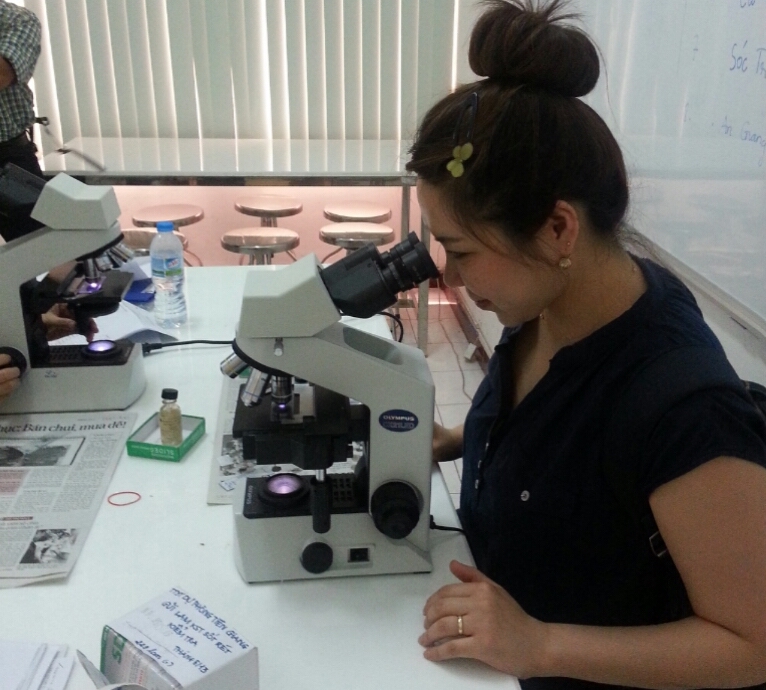
Although it has been six years since her WDI summer internship in Vietnam and Cambodia, Tae-Hwa Eo still remembers how those three months working for a nonprofit, global health organization made an impression on her. Before she began her MBA studies, she had worked for a for-profit food company in South Korea.
“I got exposed to a totally new work environment in terms of business purpose, backgrounds of colleagues and, above all, the scale of impact of my work,” she said. “Also, I was largely impressed by the passion of people I worked with. They were professionals in each field – biologics, medicines, business – and truly motivated by a greater purpose for mankind.”
Eo is using that mindset for her current role in marketing at Samsung’s credit card division as the company looks to increase its corporate social responsibility efforts in the South Korea nonprofit sector.
“As a marketer, I am committed to developing marketing activities that do good for our customers and thus show that Samsung Card is not all about making profit, but does care about its customers,” she said.

Tae-Hwa Eo
That internship experience with WDI was exactly what Eo was hoping for when she chose to pursue her MBA at the Ross School of Business.
“It didn’t cross my mind, however, that I would be a WDI fellow when I was applying for Ross,” Eo said. “But it definitely was a plus factor for me to decide which MBA program because building experiences beyond the typical business life was one of my goals to achieve while I was enrolled.”
Eo came to Ross after getting her bachelor’s degree and a master’s degree in international law from South Korean universities.
When she began searching for a summer internship, a fellow MBA student recommended she look at WDI’s opportunities. When she saw the internship listing to work in Vietnam and Cambodia for the Seattle-based global health nonprofit PATH, she immediately applied.
“I had a strong background in the healthcare industry and also had an extended work experience in Southeast Asia, which was a great combination of candidate requirements for the PATH internship,” Eo said. “I was also confident that I would do a good job once I got it because building a market penetration strategy was something I had been doing for the majority of my professional career.”
Eo spent the first couple of weeks of her internship in Seattle at PATH’s headquarters and then moved to Vietnam’s capital city of Hanoi. She would travel often to Ho Chi Minh City and other Vietnam provinces, as well as Cambodia. She conducted research on malaria control, especially in remote areas, where immediate malaria diagnosis is difficult.
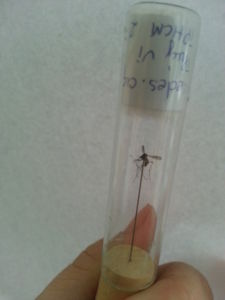 “Vietnam and Cambodia were the two target markets for this project because they have poor malaria control compared to the high prevalence of the disease,” Eo said. “Also, there is a high frequency of G6PD deficiency in the ethnic groups in those regions, for which the primary malaria treatment – primaquine – can cause life-threatening side effects.”
“Vietnam and Cambodia were the two target markets for this project because they have poor malaria control compared to the high prevalence of the disease,” Eo said. “Also, there is a high frequency of G6PD deficiency in the ethnic groups in those regions, for which the primary malaria treatment – primaquine – can cause life-threatening side effects.”
G6PD deficiency is a genetic disorder that occurs when the body doesn’t have enough of the enzyme glucose-6-phosphate dehydrogenase (G6PD). G6PD helps red blood cells work, and protects them from substances in the blood that could harm them.
Eo was tasked with developing methodology for evaluating potential national markets for point-of-care G6PD tests and the implementation requirements for those tests. Eventually, PATH wanted to work towards safe and widespread adoption of malaria treatment in Vietnam and Cambodia.
She said the experience taught her that “nonprofit organizations need not just philanthropy and a good heart, but well-developed business perspectives to satisfy all of the stakeholders involved in a project like this, such as the fund provider, the pharmaceutical manufacturer and the local healthcare professionals, to bring about the most efficient outcome.”
Eo has been with Samsung Card for a little more than four years, spending time in both business development and marketing. She enjoys working in fintech, which is a fast-growing industry in South Korea and worldwide. But she notes she’s always looking for new opportunities and likes to learn new things.
For instance, she is learning swing dance, is pursuing her international coffee barista certificate and has plans to get a professional translator certificate.
Whatever her next career path, Eo said she will not forget the lessons the WDI summer internship taught her.
“It presented me with gem experiences that I would never have had otherwise, which naturally showed me that there were more roads to take in life besides the one I was used to my whole life before getting my MBA,” she said. “But more importantly, it has taught me that life is not all about working for a big company and making more money. Instead, it is about finding what makes me happier and how I could live a meaningful day every day.”
WDI has been advising ACLEDA Institute of Business (AIB) in Cambodia on building capacity of the school. WDI conducted a benchmarking study to assess AIB’s market position and to provide strategic recommendations for AIB’s development into a world-class business schools. WDI worked with AIB faculty and staff to identify the school’s strengths and weaknesses, as well as available resources and any constraints. Following the study, an AIB delegation visited WDI in the fall of 2017 to meet with University of Michigan Ross School of Business professors and administrators to learn how the school handles a range of operations, including faculty recruitment and promotion, student services, library services, curriculum development and action learning. WDI presented AIB with a final report and suggestions for how to scale operations over the next five years. As a result of the engagement, AIB now has a clear strategy for developing its staff, faculty, operations and degree offerings.
Developmental evaluation (DE) was created to evaluate innovative programs that operate in complex environments and are thus expected to adapt over time. The Developmental Evaluation Pilot Activity (DEPA-MERL), developed under the U.S. Global Development Lab’s Monitoring, Evaluation, Research and Learning Innovations (MERLIN) program at the United States Agency for International Development (USAID), is testing the effectiveness of DE in the USAID context. The DEPA-MERL consortium consists of Social Impact (prime), Search for Common Ground (Search), and the William Davidson Institute (WDI) at the University of Michigan.
As part of the consortium, Social Impact and Search are implementing DEs while WDI is serving as an evaluator to assess the effectiveness of this approach in the USAID context.
The WDI team seeks to answer the following three research questions:
DEPA-MERL conducted a DE with Family Care First (FCF) in Cambodia, in service of FCF’s goal of increasing the number of children living in safe, nurturing family-based care.
The Sustained Uptake DE was conducted in service of the Lab’s mission to source, test, and scale development solutions. The 22-month long DE helped several of the Lab’s teams to collect, analyze, and disseminate learnings regarding the uptake of the innovations that these teams seek to promote within and beyond USAID.
USAID’s transition from Bureau for Food Security (BFS) to the proposed Bureau for Resilience and Food Security (RFS) offered a unique opportunity for the Bureau to use DE to examine its knowledge management practices and improve its processes and systems around evidence-based decision making. While the DE ultimately did not fully launch, key lessons from the attempt were documented.
In early 2020, USAID launched its first-ever Digital Strategy in order to align the Agency’s vision for development assistance with the world’s evolving digital landscape. USAID’s Innovation, Technology, and Research (ITR) Hub, formerly the U.S. Global Development Lab, is responsible for leading the strategy implementation. DEPA-MERL launched a new DE in mid-2020 to support up to four of the Strategy’s 15 implementation initiatives by providing insights into how the initiatives work within their teams and with each other as well as timely input for decision making. For the first time at USAID, the Developmental Evaluator is being embedded remotely into the initiatives due to the COVID-19 pandemic.
The WDI team also conducted an analysis across the three DE pilots that occurred during the first five years of the MERLIN award. The report, Advancing the Use of Developmental Evaluation: A Summary of Key Questions Answered during a Multiyear Study of Developmental Evaluations Implemented at USAID, shares findings and lessons learned across the experiences to facilitate learning from the implementation of DE in the USAID context.
In addition to the pilots, the consortium also provides guidance for organizations, managers, and evaluators that seek to implement the developmental evaluation approach. Available resources include:
Please find additional case studies on the use of developmental evaluation including in non-DEPA MERL pilots here. Each case study provides background on the programming, the DE design and implementation approach, the suitability of DE, and lessons learned for implementation.
Using data from the first three pilots, WDI also published a paper in the Journal of MultiDisciplinary Evaluation. The paper explores how DE theory is used in practice and aims to expand the evidence base and strengthen future DE implementation.
This article is made possible by the generous support of the American people through the United States Agency for International Development (USAID). The contents are the responsibility of WDI and do not necessarily reflect the views of USAID or the United States Government. This article was produced by the William Davidson Institute at the University of Michigan in collaboration with Social Impact under the Developmental Evaluation Pilot Activity (DEPA-MERL), Contract Order Number AID-LAB-C-15-00002, funded by the U.S. Agency for International Development.
WDI is part of two separate grants awarded by the Reproductive Health Supplies Coalition (RHSC) Innovation Fund, the organization’s flagship initiative to spur and finance promising new ideas and strategies. The coalition, which is the largest network of reproductive health organizations, aims to ensure that a range of quality reproductive health supplies are available equally to all people who need them regardless of income.
Both grants were awarded in March at RHSC’s meeting in Brussels. The first grant was awarded to WDI’s Healthcare Initiative to study and make recommendations to improve commercial distribution of family planning products in remote and underserved populations in low- and middle-income countries (LMICs).

Andrea Bare
The project, “Total Market Approach: Private Sector Distributor Landscape Analysis,” is being funded by the RHSC, a global partnership of public, private and non-governmental organizations dedicated to ensuring that all people in LMICs can access and use affordable, high-quality supplies to improve reproductive health. It will be led by WDI Senior Advisor Andrea Bare and Research Associate Erika Beidelman.
Historically, low-income people living in rural areas have less access to family planning products and services partly due to market distribution barriers. Social marketing organizations (SMOs) play a vital role in improving access to, and choice of, an assortment of family planning products at a variety of prices in underserved markets. SMOs provide product-based contraceptive social marketing programs, which are funded in part by donors, making products and/or services subsidized. As donor support begins to phase out and SMOs pursue transition to greater sustainability with less dependence on subsidies, existing distribution models will be impacted.

Erika Beidelman
Global indicators suggest that the donor resource base for family planning supplies will decrease in the future, widening the existing funding gap. Further complicating the market, demand will continue to grow as countries strive to meet global family planning goals by 2020 – increasing total commodity costs required to meet women’s needs. A RHSC gap analysis showed that in 135 LMICs there will be a $238 million funding gap in 2018 which will grow to $290 million for 2020. For the years 2018-20, the combined funding shortfall is estimated to be $793 million. WDI’s research project will address the urgency of engaging the private sector and commercial distributors as part of the global effort to address the widening funding gap and ensure availability of family planning products.
Bare and Beidelman will take an in-depth look at Malawi as an example country with high donor involvement, strong SMO presence and limited commercial presence. They will then contrast what is occurring in Malawi with countries such as Vietnam, Cambodia, Guatemala or Morocco where donor funds and SMO presence are lower and the commercial distribution sector is more mature. This assessment will map what is currently working and not working for commercial distributors, with insights into their current business and service models, barriers to participation and opportunities for improvement.
By examining Malawi against the other countries, market needs, policy conditions and opportunities can be identified to foster commercial investment and participation within the distribution sector. WDI researchers are then able to develop a set of hypothetical solutions to remedy the challenges and “concept test” them with stakeholders.
The goal is to deliver a final set of potential, recommended solutions for increasing the role of the commercial sector in family planning products distribution to rural and other underserved populations.
WDI has partnered with RHSC on a past project. In 2017, WDI, RHSC and the U.S. Agency for International Development (USAID) collaborated on Market Bookshelf, an easy-to-navigate online platform to facilitate the dissemination and sharing of global health market knowledge. The goal of the platform is to increase returns on donor and other stakeholder-funded research and help advance global health objectives through knowledge-sharing.
In the second project funded by RHSC’s Innovation Fund, WDI will partner with VillageReach on a six-month project to help improve reproductive health supply chains to increase the availability of family planning products.
Many LMIC governments own and directly operate thousands of public health clinics, and spend money to get health commodities out to the clinics. But this becomes a big challenge to reliably get products out there. As a result, governments have paid more attention to more effectively design well-functioning supply chains that align with health policy.
But designing efficient and effective supply chains often requires specialized software and data-intensive analyses, which can be expensive and difficult to manage in LMIC healthcare settings. Additionally, reproductive health commodities are unique because of the need to provide multiple product options to ensure that women are able to choose the products that best suit their specific needs.
WDI developed two different tools to simplify the process of supply chain design by addressing these software and data needs challenges. Both tools use Microsoft Excel, which is widely available, and are designed to operate without requiring intensive data collection.
The first tool uses benchmark and proxy data to help health program managers quickly estimate the cost of operating their supply chain. It can also be used to examine the cost impact of any design changes they are considering, such as delivering products more or less frequently, or integrating family planning product deliveries with other types of products, like HIV malaria medicines.
“The tool allows health program managers to quickly explore these types of supply chain design questions at a high level – questions that would otherwise require a difficult and resource-intensive analysis,” said Michael Krautmann, a senior research associate for the Healthcare Initiative.

Michael Krautmann
The second tool is more strategic in nature, helping health system leaders quickly assess a wide range of factors in their country that affect supply chain performance – geography, politics, financing, human resources – and identify the types of supply chain strategies that are most aligned with that context. Again, WDI helped minimize barriers to using the tool by designing it in Excel and using data that already exists in the global health space. Together these tools allow governments or donor agencies to quickly get answers that aid in improving supply chain design.
WDI and VillageReach have been longtime partners. VillageReach has supported the work of several WDI summer interns, and the Institute’s Healthcare Initiative partnered with the global nonprofit from 2014-16 to enhance vaccine supply chain performance by evaluating mechanisms to improve accountability of vaccine program staff in three provinces in Mozambique.
Also announced at the Brussels meeting was Bare’s election as chairwoman of the RHSC’s Market Development Approaches Working Group (MDAWG). As one of RHSC’s several mechanisms through which coalition members collaborate, MDAWG is focused on the “total market,” striving to facilitate wider private sector involvement and overall market growth. RHSC uses these working groups, along with several caucuses, to bring members and partners together to build sustained, coordinated action toward specific and agreed-upon goals.
Bare’s two-year term involves several duties, including pursuing the objectives of MDAWG to:
Bare will work closely with RHSC secretariat staff to provide leadership for the group’s workstreams and activities, to ensure the visibility of its work both internally and externally and to collaborate with other RHSC working groups.
“I am grateful for this opportunity and excited to work my coalition colleagues in MDAWG,” Bare said. “Through our individual organizations and together as a group, we aim to contribute to the private sector’s development and sustainability in order to increase reproductive health access and supply security.”
Homepage image credit UNFPA Flickr
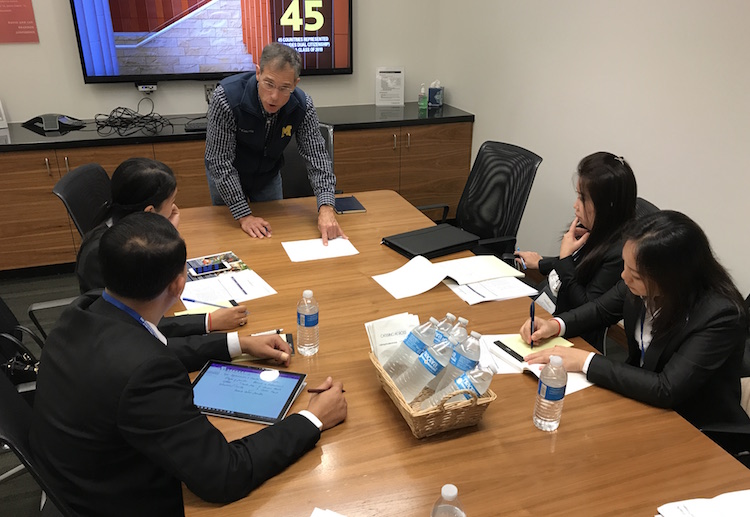
Administrators from the ACLEDA Institute of Business listen to U-M Business Professor Wally Hopp during a discussion at the Ross School of Business.
WDI’s Education Initiative recently hosted four administrators from the ACLEDA Institute of Business (AIB) in Phnom Penh, Cambodia, as part of its consulting work with the school to increase their capacity as a premier business school.
The delegation visited WDI and the Ross School of Business for three days Oct. 23-25 to meet with faculty and learn how a world-class business school approaches some of the strategic growth areas outlined for AIB in an earlier WDI report. They also discussed best practices in management education.
At Ross, the visitors met with: Wally Hopp, the C.K. Prahalad Distinguished University Professor of Business and Engineering and former Associate Dean of Faculty; Norm Bishara, associate dean for Undergraduate and Early Career Programs; and, Liz Muller, managing director of Global Initiatives, among others.
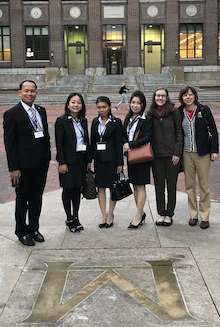
In addition to their meetings across units at Ross, the delegation toured the University of Michigan campus, visited U-M’s Center for Research on Learning and Teaching, and attended a keynote lecture by Dr. Martin Seligman, popularly known as the “father of positive psychology.”
WDI’s engagement with AIB began in August when Ross Professor and WDI Faculty Affiliate John Branch visited Cambodia to conduct a needs assessment. Through this partnership, WDI is assisting AIB as it builds degree programs in banking, accounting, and finance with both hard and soft skills.
Branch said because AIB is a relatively new university, it has a tremendous opportunity to leapfrog other existing institutions by adapting the latest technologies and best practices in higher education.
“AIB is starting with a blank slate, with no institutional inertia preventing it from implementing state of the art thinking and technology,” he said.
But Branch cautioned against simply taking the American business school model and implanting it in Cambodia.
“Cambodia’s cultural context must be considered,” he said. “Indeed, its rich cultural traditions, its economic situation, its political intrigues all must be accounted for in the design of a business school.”
WDI’s Education Initiative has assisted several business schools in low- and middle-income countries over the past 20 years by using this capacity-building and study tour model, and is looking to do more of these engagements in the future.
“Our approach has been to show our clients what has worked at successful global business schools while at the same time taking them through exercises to determine the role they want to fill in their local market,” said Amy Gillett, vice president of WDI’s Education Initiative. “Ultimately, we help them come up with a successful strategy to find their unique role in the market. Such differentiation is critical to their long-term success in an increasingly crowded educational market.”
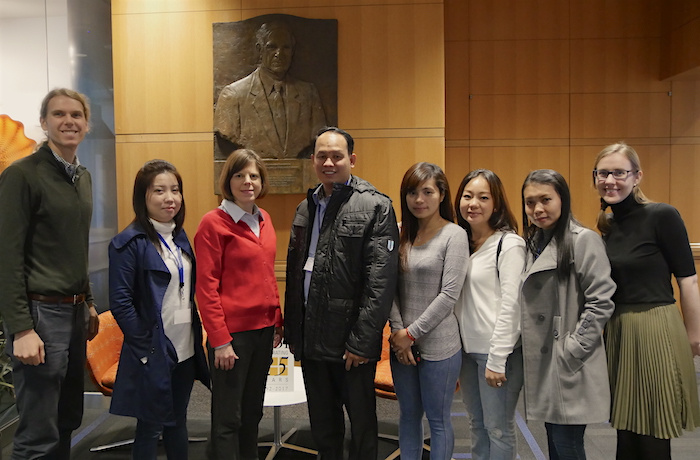
Administrators from the ACLEDA Institute of Business with members of the WDI Education and Grants Management team.
Note: This is one in an ongoing series of articles profiling past WDI interns and Multidisciplinary Action Project (MAP) team members and their career paths. Additional profiles in the series may be found here.
On June 17th, Zara Ahmed will take a moment during her hectic day to stop and think about a young girl living in a small, rural village in southwest Cameroon. It is something she has done every June 17th since 2008 when she was a WDI summer intern working for a public health nonprofit and helped a woman give birth to a baby girl who would then be named after her.
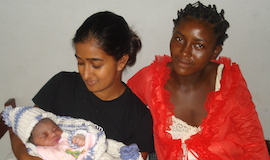
“I think back to that day and wish her a happy birthday,” said Ahmed, now the Senior Policy Advisor for Health Systems and Sustainability for the U.S. Centers for Disease Control and Prevention (CDC) in Haiti. “I wish her a future more like my own, full of opportunity, choice, support, and love.”
Despite Ahmed’s wishes, she realizes it is likely that her namesake will have a difficult life. Baby Zara’s mother was 21 when she gave birth to her third daughter, to go along with one son. Ahmed helped clean the baby after her birth with palm oil, the only clean liquid available at the minimally-equipped, one-nurse clinic.
Baby Zara’s mom was so certain she was going to have a boy that she planned to name him after Ahmed’s brother, Zamir. When Zara was born, her mother was concerned her husband – about 20 years her senior – would not be happy with another girl, and initially ignored the newborn.
Her husband eventually visited and begrudgingly gave his approval. Baby Zara’s mother began to bond with her new daughter, but talked excitedly about giving birth next to a son.
“This experience breaks my heart every time I think of it, which is quite often,” Ahmed said. “Baby Zara was born into a family that had few resources to offer her beyond their love. She was born into a life with few prospects, will likely have little education, suffer from preventable diseases, marry early, and endure risky pregnancies and childbirth of her own.
“She will not be afforded the same privileges I have – proper nutrition, years of schooling, advanced health care, reproductive choices – unless our world dramatically changes for the better.”
Trying to make the world a better, healthier place has been Ahmed’s work since graduating from the University of Michigan in 2009 with dual master’s degrees in public policy and public health. After graduation, she spent several months in Bangladesh as a consultant with the U-M President’s Advisory Committee on Labor Standards and Human Rights looking at issues of female migrant worker rights and conditions in the factories where U-M-branded goods were produced.
While in Bangladesh, she was selected for a CDC global health fellowship. She took a position on the CDC’s Health Systems Strengthening team in Rwanda in fall 2009, and on her first day was put to work on the then re-emerging H1N1 swine flu outbreak. Two days later she was part of the group briefing the country’s Minister of Health.
She was later named Health Systems Strengthening Advisor and became a CDC contractor. After three years in Rwanda, she moved to Namibia to become the CDC Health Policy and Communications Team Lead. Two years later, she moved to Haiti and assumed her current role.
All this moving around is nothing new for Ahmed, who was born in Scotland, moved to the U.S. at age 3, went to Brown University in Rhode Island for her undergraduate studies and then to U-M. “At 31, I am currently living in my 27th house so I’ve gotten quite good at packing and moving,” she said.
She originally came to Michigan to get dual degrees in public policy and social work. But she soon realized that the intersection of public policy and public health “spoke to my real interests and passions.”
During her second year at U-M, Ahmed was looking for funding for a public health internship and talked to several friends at the Ross School of Business who spoke highly of WDI and its support for students – particularly those pursuing innovative collaborations or projects.
“From the start, the team at WDI was extremely supportive, professional, and enthusiastic,” Ahmed said. “It felt like a perfect match for me.”
Her 2008 WDI-supported internship was with a group called Peacework based in rural, southwestern Cameroon along the Nigeria border. Working through a local partner, United Action for Children, Ahmed’s primary job was to assess the local public health capacity. She used information on burden of disease, demand for services, availability of resources, and other factors to develop a plan to revitalize health clinics that had lost their funding due to donor withdrawals.
She explored several models, including community-based financing and public-private partnerships. She interviewed dozens of patients and providers, and visited approximately 20 health clinics, often walking from village to village because most of the roads were washed out. She regularly spent several days at a stretch in a single clinic, sleeping on a cot or the floor.
The daughter of a physician and a medical practice administrator, Ahmed thought she was familiar with the basics of health care financing and management going into her internship.
“The daily issues that come up when running a one- or two-person health center in a remote village are hard to imagine until you’ve seen them up close,” she said. “More than interviews with staff or reviews of facility records, simply observing the rhythms of the clinics, the comings and goings of patients and friends, the role clinics play in villages of a few hundred people, and the innovative problem-solving of the staff taught me so much about leadership, management, and resilience. Those observations provided a crash course in the business of health care at the most decentralized level where people’s critical, basic needs are met.”
Those experiences in Cameroon – coupled with Ahmed’s other international experiences at U-M in Cambodia, Bangladesh and Senegal – continue to inspire and provide guidance in her current role at the CDC. Today, she is engaged in all aspects of policy, planning, strategy, and coordination of CDC’s work in Haiti. As a result, she works closely with CDC Haiti’s management, technical, and operations teams and the organization’s headquarters in Atlanta. She also interacts with numerous U.S. government agencies, such as USAID and the Departments of State, Defense, and Treasury, and global partners such as the World Bank, World Health Organization, and the Global Fund.
Ahmed said she often reflects on “the twists and turns of fate” that got her to Haiti, including her WDI internship in Cameroon. That experience, along with the others, “grounded me in the realities of global health, policy, and development, and gave me insight into various ways of thinking about issues across cultures and professions. Those skills and experiences made me a much better candidate in the job market, as I truly grasped the challenges and opportunities facing organizations like the CDC,” she said.
Her globetrotting ways are not for everyone, she said. Living and working overseas can be lonely, isolating and exhausting. But it also can be rewarding, stimulating, and enlightening. In the end, she said, you never know if living and working abroad, with its new situations and cultures, is for you until you try it.
“When I was a student at U-M applying for internships, never could I have imagined that I would be trudging through muddy, washed-out roads in the forests along the Cameroonian-Nigerian border having just helped deliver, in a one-room health clinic, a baby named after me,” she said. “That fact alone is proof that I don’t know what’s in store for my life and career, and something that I think about to this day.”
Ray Cummings, director of market dynamics for the global nonprofit health organization PATH, recently sat down for a one-on-one video interview with WDI’s Andrea Bare to discuss how it works to improve global health outcomes. The two also talked about Cummings’ career and how U-M students interested in the healthcare field can get involved in global health.
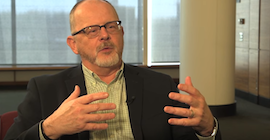
Cummings also spoke to U-M students for the WDI Global Impact Speaker Series on Feb. 17 about how PATH is addressing the challenge of improving coverage rates for many childhood vaccines in low-income countries.
“Ray has deep expertise in healthcare technology development and commercialization in both developed and emerging economies,” said Bare, senior advisor in the WDI Healthcare Initiative’s Market Dynamics group. “He works from the vantage point of several years in biopharmaceuticals business development and partnering, and has brought that expertise to PATH where he has led or contributed to projects for drugs, vaccines, and diagnostics in diseases such as malaria, HIV, and Japanese Encephalitis.”
Cummings’ market dynamics department provides analytical and strategic support for PATH programs that are working with both non-profit and commercial partners to develop new therapies, vaccines and diagnostics for underserved populations around the world. He also has served as commercialization director for PATH’s drug development global program, and senior business officer in its vaccine and pharmaceutical technologies group.
Cummings is the second Global Impact Speaker from PATH. In 2013, Amie Batson, chief strategy officer of PATH, spoke for the WDI speaker series. View a one-on-one interview with Batson here.
Also, PATH has partnered with WDI on several summer internship projects, including 2011 in Bangladesh, 2012 in India, 2013 in Vietnam and Cambodia, and 2015 in the U.S., South Africa, Ghana, and Uganda.
WDI and PATH are currently discussing the scope of a 2016 summer internship with the organization.
Prior to joining PATH in 2009, Cummings held senior business development positions at AVI BioPharma, Inc. (now Sarepta Therapeutics), GD Searle & Co., and Immunex Corp. (now part of Amgen Inc.).
Cummings has a bachelor’s degree in biological sciences from Stanford University, a master’s degree in biochemistry and molecular biology from Harvard University, and an MBA from the University of California, Berkeley.
Vaccines save 2.5 millions lives annually according to the World Health Organization, and during the past 15 years major strides have been made in coverage rates for many childhood vaccines in low-income countries.
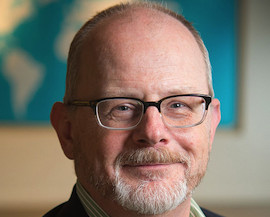
However, challenges remain as evidenced by the 1.5 million children under the age of 5 who still die each year from vaccine-preventable illnesses. Reducing this number will require progress on a range of economic issues related to vaccine procurement funding, reductions in vaccine costs, and economic sustainability of existing vaccine products.
Ray Cummings, director of market dynamics for PATH, will discuss how the Seattle-based international, nonprofit health organization is addressing these challenges as part of the WDI Global Impact Speaker Series.
Cummings’ Feb. 17 talk, “Economics of Global Vaccine Markets and Current Challenges,” will begin at 5 p.m. in Room R2220 at the Ross School of Business. It is free and open to the public.
“Ray has deep expertise in healthcare technology development and commercialization in both developed and emerging economies,” said Andrea Bare, senior advisor in the WDI Healthcare Initiative’s Market Dynamics group. “He works from the vantage point of several years in biopharmaceuticals business development and partnering, and has brought that expertise to PATH where he has led or contributed to projects for drugs, vaccines, and diagnostics in diseases such as malaria, HIV, and Japanese Encephalitis.”
Cummings’ market dynamics department provides analytical and strategic support for PATH programs that are working with both non-profit and commercial partners to develop new therapies, vaccines and diagnostics for underserved populations around the world. He also has served as commercialization director for PATH’s drug development global program, and senior business officer in its vaccine and pharmaceutical technologies group.
Cummings is the second Global Impact Speaker from PATH. In 2013, Amie Batson, chief strategy officer of PATH, spoke for the WDI speaker series. View a one-on-one interview with Batson here.
Also, PATH has partnered with WDI on several summer internship projects, including 2011 in Bangladesh, 2012 in India, 2013 in Vietnam and Cambodia, and 2015 in the U.S., South Africa, Ghana, and Uganda.
WDI and PATH are currently discussing the scope of a 2016 summer internship with the organization.
Prior to joining PATH in 2009, Cummings held senior business development positions at AVI BioPharma, Inc. (now Sarepta Therapeutics), GD Searle & Co., and Immunex Corp. (now part of Amgen Inc.).
Cummings has a bachelor’s degree in biological sciences from Stanford University, a master’s degree in biochemistry and molecular biology from Harvard University, and an MBA from the University of California, Berkeley.
The International Labour Organization aims to promote rights at work, encourage decent employment opportunities, enhance social protection and strengthen dialogue on work-related issues. Student intern Soomin Kang worked on capacity building in Cambodia for the Community-Based Enterprise Development (C-BED) program of ILO.
PATH is an international, nonprofit organization that creates sustainable, culturally relevant solutuiosn, enabling communities worldwide to break long-standing cycles of poor health. Student intern Tae-Hwa Eo identified the demand for point-of-care glucose-6 -phosphate dehydrogenase deficiency testing in the context of malaria treatement in Vietnam and Cambodia. Tae-Hwa Eo also developed a market introduction strategy for the testing.